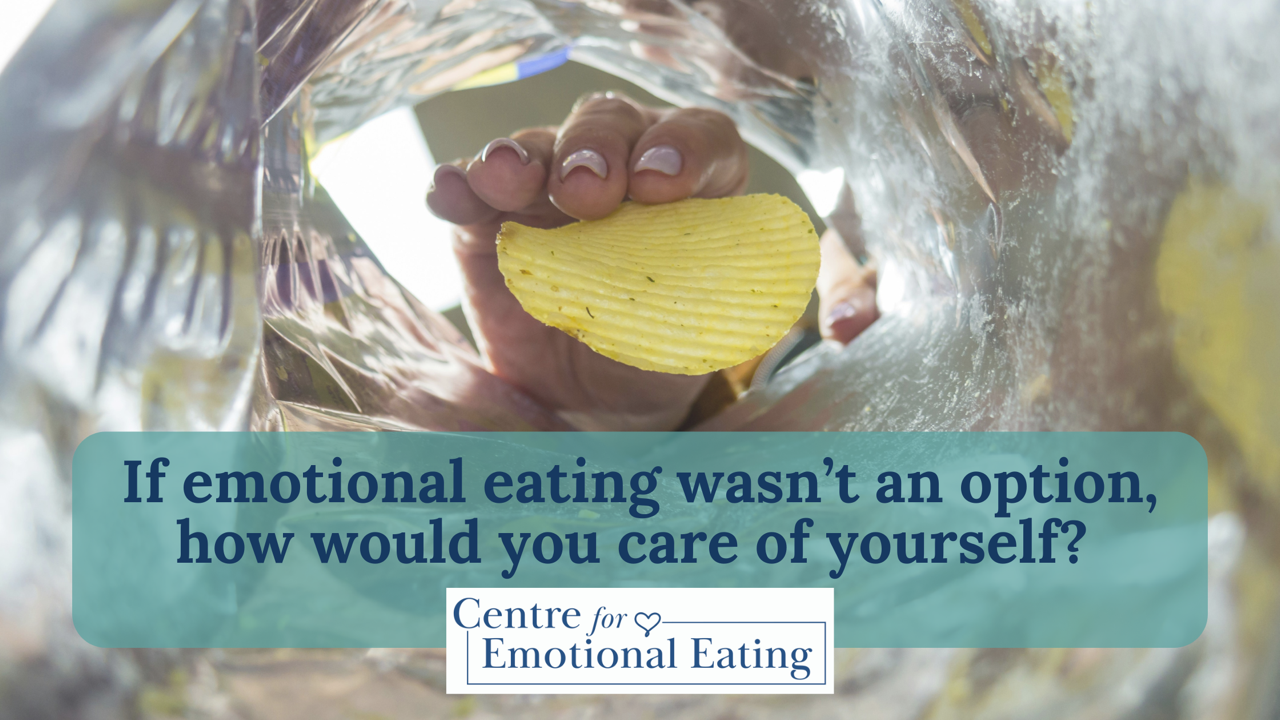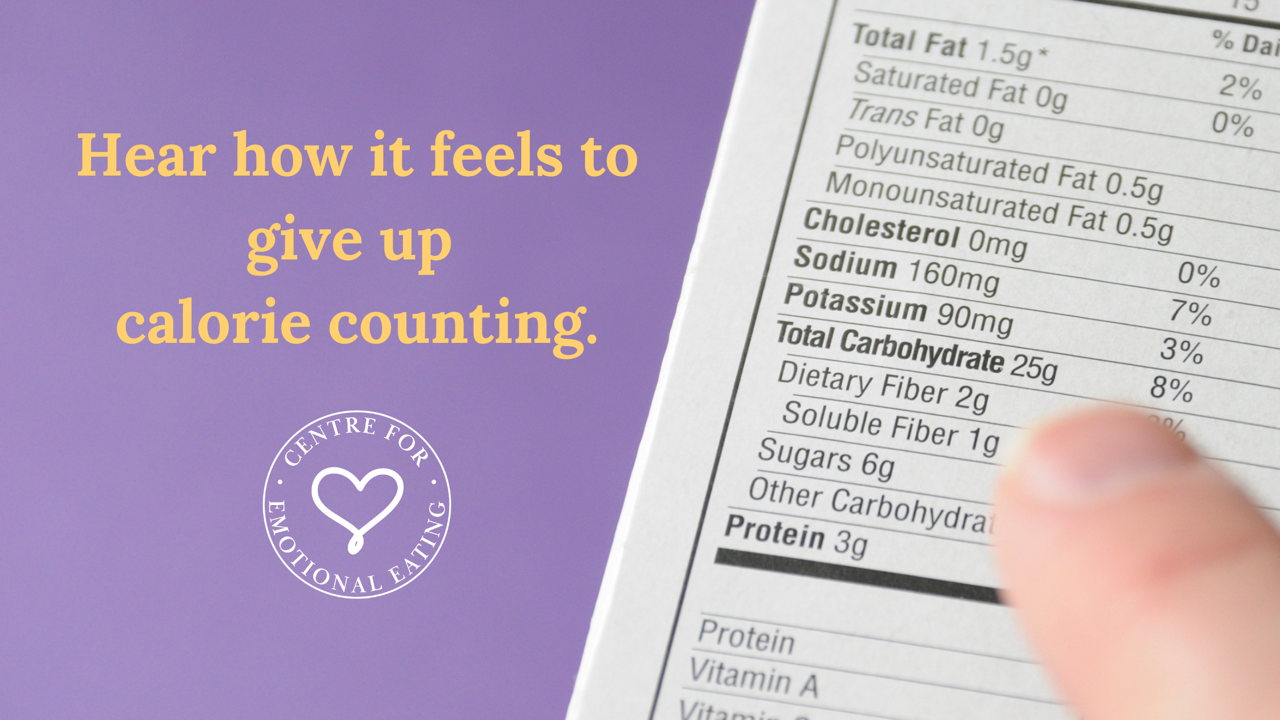BLOG
Find support not just for emotional eating, but all aspects of your well-being.
Client Insight: “I shifted how I thought about working out and it changed my relationship with my body.”

As an emotional eater you might feel constantly at war with your body. Trying to ignore cravings, stuff down feelings, and constantly critiquing your body. You might even feel betrayed by your body every time the scale goes up or your pants feel tighter.
A lot of this conflict comes from diet culture which encourages us to follow its rules instead of our own needs and wants. One of the most common rules, that you’ve probably engaged in, is the idea that movement is a means to an end to burn the greatest number of calories. If you’ve ever slogged through a workout or pushed past pain to hit a calorie target, chances are you have a not great relationship with movement.
But there are so many reasons to move your body that have nothing to do with your appearance! Read on to start reframing how you move your body and create more appreciation for all it does for you every day!
Forget Calories, Find Play
If you weren’t focused on how many calories you were burning, what movement would you...
Client Insight: “It felt scary when therapy started to change how I saw myself and others.”

Doing the work in therapy often comes with challenging the stories you’ve always told yourself. Over time we solidify ideas about ourselves, our relationships, and the world around us. This can sound like:
“I’m broken.”
“I’ll always be an emotional eater.”
“My mom did the best she could.”
But as you face these narratives about yourself, you’ll start to find the wiggle room, the space to start re-thinking how you see yourself and what that means for your identity. This can feel destabilizing! It is scary if you always thought of yourself or those in your life one way, only to unpack that things are different that they first appeared. It can feel easier to stick with the familiar way you’ve always understood your family and friends, and even yourself.
While this experience is uncomfortable, it is also a great sign that therapy is getting to the root of your experiences. Let’s flip the script: changing how you see the world is like taking off a pair of tinted sunglasses.
Let’s try t...
Client insight: “Emotional Eating is my Comfort… And it’s Comfortable”

After working with emotional eaters for more than a decade, it is common to hear from clients that they don’t understand why they keep emotionally eating when it makes them feel terrible.
They can’t stand the overfull feeling after a binge.
They hate hiding from others and sneaking food.
They judge their worth by thinking they need more willpower to get their shit together.
They dread the judgement, guilt, and self-hatred that comes after eating.
They’re ashamed of how much money they spend on food.
For something that is supposed to bring a sense of comfort, these things sound like anything but! So, why are you stuck in this emotional eating cycle when you know it doesn’t feel good? It isn’t about cravings for specific foods or an “addiction to sugar.”
It is because emotional eating is familiar. It is the predictability, even the negative side of it, that offers you a sense of comfort. You know what to expect and our brains are wired to go with what we know. Yup, even when what ...
Client Insight: “I lost weight, but my brain still criticized my body size.”

The following blog posts talks about weight loss. If this is something that might bring up negative feelings for you, please skip this post to protect your mental and physical health.
Weight loss can happen for all kinds of reasons, from anxiety to happiness to stress to a change in routine. So, it should come as no surprise that emotional eaters come in all shapes and sizes! What I often hear from clients who have lost weight on their journey is that they still find themselves criticizing their body in the same way as when they weighed more.
Does that surprise you?
Many people I work with at the Centre for Emotional Eating believe that if they could just “get a handle” on their emotional eating that everything would all into place—their waistline would shrink, they’d be a kinder person, get that promotion, they’d finally do that thing they’ve always want to.
This is why dieting is so tempting: it markets itself as a cure-all when in reality it keeps you stuck in failure mode beca...
Client Insight: “My emotional eating led to weight loss—it was celebrated, but I felt awful.”

It’s true that we never really know what someone else is going through. We’ve covered in another post how not all emotional eaters are overweight, and sometimes emotional eating can lead to weight loss in an unexpected way.
For some clients, when emotions run high, they feel the need to control their eating as a way of trying to control their lives. For them it feels like the only thing they have power over is what they put in their mouth—not their kid’s tantrum, their boss’s feedback, or their partner’s attitude.
While in this scenario there is an absence of food, instead of a binge, it is still emotional eating because a person’s eating pattern has changed in response to emotional experiences. For example, this can look like telling yourself you’re too busy to eat, believing you’re not worthy of nourishment, not having motivation to cook and eat, or feeling a physical surge of anxiety that makes your stomach queasy. Experiencing these actions long enough can lead to weight loss.
T...
Client Insight: “I spoke up when it felt therapy had stopped working for me—and it made all the difference!”

There are so many different types of therapy, it can be overwhelming when you’re starting out. While there are definitely things to consider when choosing a therapist, identifying when a method of therapy isn’t working is a powerful way to make progress on your mental health journey.
What does it look like when therapy isn’t working for you? It is important to remember that your ‘aim’ in therapy can be a moving goal post. For example, you might start therapy to manage your depression but after dealing with the immediate symptoms you and your therapist might begin focusing on your childhood experiences that are informing your current behaviour. This is normal!
But you shouldn’t be leaving your sessions feeling frustrated. While a therapy ‘hangover’ is expected, you should feel at least slight relief at being heard and supported through a session. It can be helpful to journal or just jot down how you feel after a session to keep track of your progress and new coping tools you’ve learnt...
Client Insight: “I needed a plan to support myself for how I felt after a therapy session.”

If you are on your therapy journey—in one-on-one sessions, online courses like First Step, or other—we applaud you! It takes a lot of courage to open up and decide to actively work on yourself.
You might be finding that after a session you don’t feel 100%. You may walk away feeling sad, angry, exhausted or anything in between. And we want to reassure you that that is completely normal. It can be emotionally and physically draining to be vulnerable when looking at your behaviours and digging into your past trauma—some even call this feeling “a therapy hangover.”
Here’s how to not let these after appointment feelings stop you from doing this important work. Many clients have shared that there are specific things they do to give themselves comfort.
- Book your appointment or time for your online course at the end of your work day. This means you don’t have to shift back into a work headspace immediately after, putting back on a “I’m fine” mask in front of others. If you can’t schedule ...
Client Insight: “It was scary, but I’m glad I stopped counting calories.”

The following blog posts talks about calorie counting in some detail. If this is something that might bring up negative feelings for you, please skip this post to protect your mental and physical health. 💛
After eating emotionally you might be thinking you need to do a complete 180 and get really strict about what and how you’re going to eat next. A common way to feel in control of your eating is to count your calories. It’s become so easy these days as the diet industry has created apps that are always in the palm of our hands and can even scan labels!
Often clients will be able to white knuckle their way through a few days of eating low calorie only to find themselves binge eating at the first sign of stress, alone time, or even faced with a dinner they can’t ‘log’. And it can feel like being right back where you started after the initial overeating episode.
Very often it feels scary to let go of counting calories, but doing so can bring you back in-tune with your body in a way yo...
Client Insight: “I cleaned out my ‘skinny’ clothes from my closet and I love the result.”

For many of you who have been on the diet rollercoaster for years, you probably have collected two wardrobes: one you’re trying to feel good in now and the other is the clothes you hope to fit back into one day. You might even find yourself putting off buying clothes you feel your best in because you’re waiting to lose weight and don’t want to ‘waste’ the money.
Here at the Centre for Emotional Eating we hear this from clients often! Not only is there a wish to one day be the smaller size you were previously, a lot of the time you also have emotional ties to those clothes because of who you were when you wore them. For example, one client loved her blouses and pencil skirts because it reminded her of a time when she was happy in her career.
But getting rid of these clothes will not only free up real space in your closet it will also free up mental space. Here’s what we hear from clients once they’ve taken the plunge and cleaned out their closets of clothes that no longer fit them or ...
Client Insight: “Therapy was about learning to manage my trauma, not get rid of it”

Emotional eaters tend to be tempted by a quick fix, especially if you’re weight goes up and down with your feelings. Heck, that’s how they sell diets to us again and again: “lose 20 lbs in a week!”, “Here’s the one thing you need for lasting weight loss.” The truth is, there is no quick fix when it comes to a healthy lifestyle. And that’s true about therapy too.
When first dipping their toe into therapy, clients will often begin look for a concrete timeline on when they can expect to have managed their grief or processed their trauma. This makes sense: we want to know when the tough stuff will end so we can get on with living out lives. But the difficult thing about these experiences that impact our emotions, outlooks, and actions, is that they will always be with us in some capacity.
But don’t lose hope! Therapy not only gives you an outlet to process your emotions, but you also learn strategies along the way that you can draw on when you need to. For example, if someone had lost th...


